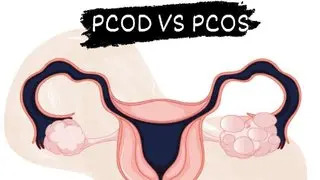Preventive Healthcare
What is the Difference between PCOD vs. PCOS?
4287 Views
0

Most people use PCOS and PCOD interchangeably as these conditions are related to the ovaries, cause hormonal disturbances, and may affect women's fertility. However, PCOS and PCOD are not the same.
Women have two ovaries that release an egg every alternate month. The ovaries also produce hormones that regulate the menstrual cycle, determine fertility, and affect a woman's overall health. PCOS and PCOD cause similar symptoms, and it is common for women to get confused between the two.
Here's what you need to know about PCOS vs. PCOD!
What is PCOS?
PCOS is an endocrine disorder in which the ovaries produce a higher quantity of the male hormone, leading to the formation of over ten follicular cysts in the ovaries every month. Due to the cysts, there is no egg release (ovulation), resulting in anovulation. If not treated in time, PCOS can result in infertility and an increased risk of type 2 diabetes and heart disease.
Causes of PCOS
The exact cause of PCOS is unknown, but a few factors that may contribute to the development of the condition are:
- Insulin resistance
- Excessive production of male hormones
- Genetics
- Low-grade inflammation
Symptoms of PCOS
PCOS symptoms usually start around the time a girl gets her menstrual period. Having two or more of the following symptoms can help confirm a PCOS diagnosis:
- Irregular menstrual cycles and heavy bleeding during the cycle
- Excessive weight gain
- Abnormal hair loss and hair thinning
- Severe and frequent acne
- Skin darkens on parts like the neck, underarms, intimate areas, inner thighs, etc.
- Skin tags
- Infertility
- Fatigue
- Abnormal abdominal pain
What is PCOD?
Polycystic Ovarian Disorder (PCOD) is a medical condition in which the ovaries produce immature eggs, which results in swollen ovaries, hormonal disturbances, and other similar symptoms. The immature or partially-mature eggs that the ovaries produce can result in the formation of cysts.
PCOD usually runs in families, and having a first-degree relative with this condition increases a woman's risk of developing it.
Causes of PCOD
A few common risk factors that may cause PCOD are:
- Unhealthy lifestyle
- Hormone-altering medication
- Some supplements and medications
Symptoms of PCOD
Though similar to PCOS, commonly occurring symptoms of PCOD are:
- Excessive hair growth on the body
- Irregular periods with heavy bleeding
- Obesity
- Disturbed sleep cycle
- Mood swings
PCOS Vs. PCOD: Major Points of Difference
If you are still unsure how to differentiate PCOS vs. PCOD, here are some significant points to differentiate them.
Fertility
One of the differentiating factors between PCOS and PCOD is fertility. Women with PCOD can conceive with little medical help and lifestyle changes. On the other hand, women with PCOS usually struggle with infertility issues and are at a higher risk of miscarriages.
Serious complications
Women with PCOS risk developing chronic diseases like diabetes, high blood pressure, obesity, cardiovascular diseases, endometrial cancer, and infertility.
PCOS vs. PCOD Visible Symptoms
Women with PCOS conditions can have visible symptoms such as severe acne, excessive facial hair growth, weight gain, fatigue, etc., early in life. However, PCOD might be evident later in life.
Treatment
PCOD is a milder condition that can be corrected with slight changes in diet, exercise, and lifestyle. However, PCOS is a serious condition that cannot be cured, but symptoms can be effectively managed using medications, lifestyle changes, and exercise routines.
Causes
Though the exact causes of PCOS and PCOD are unknown, PCOS is a disorder of the endocrine system that causes the ovaries to produce androgens (male sex hormones). On the other hand, PCOD is characterised by the production of immature eggs by the ovaries that result in hormonal imbalance.
There may be a link between PCOD and excessive testosterone levels, insulin, and low-grade inflammation. PCOS may be caused by high testosterone, luteinizing hormone, and prolactin levels.
Prevalence
PCOD is more common than PCOS, and around one-third of women worldwide suffer from the former.
PCOS and PCOD and Their Relation to Diet
Many people presume PCOS and PCOD are caused by poor diet. However, it is important to understand that while an unhealthy diet cannot directly cause PCOS or PCOD, eating a healthy diet helps better manage symptoms, prevents the condition from recurring, and improves overall health and well-being. PCOS is associated with obesity, and eating low sugar can help with weight loss and insulin resistance and relieve symptoms.
With both conditions, eating a healthy diet that is free of processed and junk foods and regular exercise show improvements in symptoms.
What is the Difference Between PCOS and PCOD vs. Endometriosis?
Another common condition related to the female reproductive system is endometriosis.
Endometriosis is a painful condition in which the lining of the uterus (endometrium) grows outside the uterus in the ovaries, fallopian tube, or vagina. This condition primarily causes extreme pelvic pain and excruciating menstrual cramps. These symptoms differ from common symptoms of PCOS and PCOD, enabling medical professionals to differentiate between PCOS and PCOD vs. endometriosis. The treatment for endometriosis is also different from PCOS and PCOD.
The Bottom Line
PCOS and PCOD are common menstrual health issues, but if not treated well, they can lead to severe health concerns. PCOS vs. PCOD is a common confusion, but medical professionals will be able to identify and treat them appropriately. The correct diagnosis will help you get the best treatment. Contact Metropolis diagnostic lab to help you book any medical test.























 WhatsApp
WhatsApp
